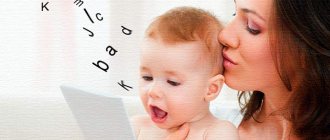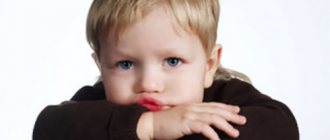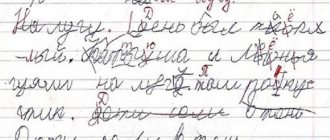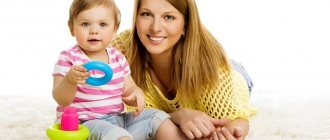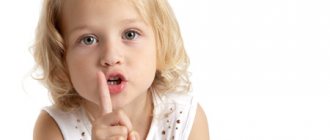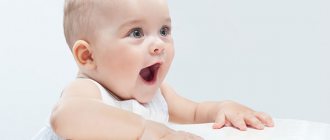The main stages of the formation of the speech apparatus
There are 2 main stages of speech formation: passive accumulation of words (the baby does not yet know how to speak, he only listens to the speech of his parents and other people around him and remembers, learns to reproduce words and sounds, but is not yet capable of exact repetition) and active accumulation of words (the child repeats heard sounds, can reproduce whole words, phrases, sentences).
To the question of how old children begin to speak, the answer will vary from one to three years. During this period, speech changes greatly, becomes active, meaningful, includes not only individual words, but also phrases and sentences, the complexity of which gradually increases . It is impossible to answer exactly at what months a child begins to speak the first sounds; this process is individual. If you suspect a delay in speech development, it is better to consult a pediatrician.
Stages of child speech development
A newborn can only scream and cry; He doesn't make any other sounds yet. A scream indicates to adults any need: food, drink, changing a diaper. A baby may scream if it is in pain, discomfort or scared.
However, there are also smaller stages. In the first month after birth, the baby learns to respond to speech and can reproduce any sounds in parallel with a speaking adult. Then learning to reproduce simple sounds and individual syllables occurs. Later, children learn to determine intonation and recognize by their voice who is speaking to them: mom, dad or other close relatives.
Around 8 months, repeated syllables appear in the child’s speech. A little later, children learn to speak simple words consisting of identical syllables. By the age of 1, they understand words addressed to them well and can fulfill simple requests. The vocabulary consists of several words made up of repeated syllables. After this, the vocabulary quickly increases, and the child’s speech becomes more similar to that of an adult.
Normally, children begin to speak after a year: the phrases they utter gradually become more complex. When children begin to talk, you should monitor the quantity and complexity of what is said: there are age standards, failure to comply with which doctors consider a deviation in speech development, a delay.
How to stimulate babbling
From 6 months, children are able to move in space - sit and crawl. Their perception improves, they can repeat sounds after adults. This skill can be developed - as soon as the child pronounces the syllables, the parents repeat them after him. This technique develops hearing, articulation organs, speech exhalation, and encourages the baby to pronounce these syllables again and again. Such mini-lessons are carried out with a cheerful, well-fed and healthy baby. If he is cold, hungry, or unwell, verbal games with his parents will not do any good.
It’s good if the child sees the face of the one who is talking to him, then he will be able to repeat the movements of his mother or father’s lips. In order for sounds to be heard clearly, you need to ensure complete silence - turn off the music, mute the sound of the TV.
You can play “hide and seek” by covering the baby’s face with a diaper and saying “peek-a-boo.” Showing adults objects of the environment develops passive vocabulary well. In this case, you need to clearly name them, accompanied by a pointing gesture. Soon the child will find them with his eyes, reacting to the adult’s question “Where is the watch?”, “Where is the cat?”, “Where is the car?”
At what age does a child say his first words?
Repeated syllables can appear in baby babble as early as 6-8 months, but calling them words is incorrect: the child only repeats the syllable many times, makes more repetitions than required, and may not understand the meaning of what was said.
At the same age, it is possible to copy surrounding sounds and attempts to imitate animals, which should also not be taken into account.
According to the standards established by pediatricians, the child begins to pronounce and speak his first words at approximately 8-10 months. First he pronounces those that consist of the same syllables: “mama”, “lala”, “dad”, etc. More complex ones are pronounced later, often after a year. It is also possible to pronounce monosyllabic words: “give”, “na”. There are many individual syllables in speech, some of which children designate surrounding objects that have names that are too long and complex for a small person.
When does a child start saying “mama” and “dada”?
Most children begin to say “mama” and “dada” between 9 and 11 months. At the same age, other similar words appear: “lyalya”, “baba”, “uncle”. When a child begins to say “mom” depends on his individual characteristics. If the mother prefers to tell the child her name, the baby grows up without a father, it may take longer, since the small child reproduces only what he heard before.
When will the baby learn to form phrases?
Babies will speak phrases later. Boys begin to speak in sentences and phrases more often later than girls. The difference, however, is not too great, rarely exceeding 1-2 months. Most children learn their first word combinations between the ages of 1 and 1.5 years.
Sometimes a child begins to talk later: often this disorder is caused by a long-term illness. It is recommended to visit a child psychologist or neurologist if speech disorders are noted.
Time for conscious pronunciation of words
All parents want to know when their child says “mama.” The time for conscious pronunciation of words varies for each child and is determined by the following factors:
- Gender (boys usually start speaking later than girls);
- Heredity;
- The presence or absence of abnormalities in the development of the palate and tongue (for example, speech development may slow down with a shortened frenulum);
- Features of the bite;
- Individual temperament of the child.
The physical well-being of the baby also plays a big role. Often sick children begin to speak later than their peers.
Achievements up to six months
During the first month of life, the baby learns to respond to the speech of adults. Often children walk parallel to the conversations of adults. This happens especially often if parents talk to the baby and address him. Begins to distinguish intonations: the mother’s affectionate address helps to calm down faster, screams and aggression are frightening and can cause crying.
By 3 months, the first syllables appear. They are simple, consisting of a small number of sounds. You can hear “ua”, “gu”, “ga”.
By 4-5 months, baby talk acquires an emotional connotation. The child does not just sing or squeal: you can distinguish the intonation with which the sounds are pronounced. Reacts well to adult speech, understands intonation better; When a child hears a sound, he can turn his head correctly in the direction of its source.
At the age of six months, children recognize their parents' voices well, even with a large number of people around. Syllables vaguely reminiscent of “ma” and “pa” slip into speech. They will become clearer only closer to 7 months.
Sources
- Wu Y., Li G., Zheng Y. . // Lin Chung Er Bi Yan Hou Tou Jing Wai Ke Za Zhi - 2022 - Vol35 - N4 - p.341-345; PMID:33794634
- Karcher NR., Loewy RL., Savill M., Avenevoli S., Huber RS., Simon TJ., Leckliter IN., Sher KJ., Barch DM. Replication of Associations With Psychotic-Like Experiences in Middle Childhood From the Adolescent Brain Cognitive Development (ABCD) Study. // Schizophr Bull Open - 2022 - Vol1 - N1 - p.sgaa009; PMID:32803159
- Skovlund E., Selmer R., Skurtveit S., Brandlistuen RE., Handal M. In utero exposure to analgesic opioids and language development in 5-year old children. // Pharmacoepidemiol Drug Saf - 2022 - Vol29 - N6 - p.736-744; PMID:32383248
- Yi YG., Lee DW., Kim J., Jang JH., Lee SM., Jang DH. Two Novel Mutations (c.883-4_890del and c.1684C>G) of WDR62 Gene Associated With Autosomal Recessive Primary Microcephaly: A Case Report. // Front Pediatr - 2022 - Vol7 - NNULL - p.457; PMID:31788460
- Llaci L., Ramsey K., Belnap N., Claasen AM., Balak CD., Szelinger S., Jepsen WM., Siniard AL., Richholt R., Izat T., Naymik M., De Both M., Piras IS., Craig DW., Huentelman MJ., Narayanan V., Schrauwen I., Rangasamy S. Compound heterozygous mutations in SNAP29 is associated with Pelizaeus-Merzbacher-like disorder (PMLD). // Hum Genet - 2022 - Vol138 - N11-12 - p.1409-1417; PMID:31748968
- Wu Y., Li G., Ma Y., Zheng Y. . // Lin Chung Er Bi Yan Hou Tou Jing Wai Ke Za Zhi - 2022 - Vol33 - N10 - p.918-922; PMID:31623034
- Botticelli S., Küseler A., Mølsted K., Andersen HS., Boers M., Shoeps A., Emborg BK., Kisling-Møller M., Pedersen TK., Andersen M., Willadsen E. Influence of Infant Cleft Dimensions on Velopharyngeal Function in 5-Year-Old Danish Children Born With Unilateral Cleft Lip and Palate. // Cleft Palate Craniofac J - 2020 - Vol57 - N4 - p.420-429; PMID:31505955
- Salvago P., Gorgone E., Giaimo S., Battaglia E., Dispenza F., Ferrara S., Martines F. Is there an association between age at first words and speech sound disorders among 4- to 5-year-old children ? An epidemiological cross-sectional study based on parental reports. // Int J Pediatr Otorhinolaryngol - 2022 - Vol126 - NNULL - p.109602; PMID:31374388
- Ingram SB., Reed VA., Powell TW. Vowel Duration Discrimination of Children With Childhood Apraxia of Speech: A Preliminary Study. // Am J Speech Lang Pathol - 2022 - Vol28 - N2S - p.857-874; PMID:31306605
- Dawes E., Leitão S., Claessen M., Lingoh C. Oral literal and inferential narrative comprehension in young typically developing children and children with developmental language disorder. // Int J Speech Lang Pathol - 2022 - Vol21 - N3 - p.275-285; PMID:31159597
What can a baby say before 12 months?
By 7 months, the syllables “ma”, “pa”, “ba” are clearly distinguishable and pronounced clearly. The child actively imitates animals (barking dogs, meowing cats and other sounds), well understands simple requests addressed to him (“give”, “bring”, “show”). Knows the names of most surrounding objects, although he is not yet able to name them.
At 8 months, babies actively speak in syllables. The sounds used are “a”, “g”, “k”, “b”, “p”, “u”, “m”, “e”, “n”.
9-11 months is the age at which the baby expands its vocabulary. Can pronounce up to 10 simple words consisting of one syllable or 2 repeated ones.
Not all children's words can be found in adult speech. Little ones often simplify complex names into onomatopoeias: they call a dog “av-av”, a car “bi-bi”, a train “too-too”. The child understands what he sees and can show an object if an adult names it, but is not able to reproduce a complex word on his own.
Why are children now learning skills late?
There may be several reasons why many parents are forced to turn to a speech therapist. The main ones are:
- Indifferent attitude of adults to the problem. Leaving everything to chance is very risky. Parents should remember that hoping to overcome speech defects on their own may be worth long and expensive work with a specialist.
- Ecological situation. Polluted air and exhaust gases can significantly slow down a baby's development. As a result, you need to carefully monitor your diet, actively exercise, and take vitamins and minerals after consulting your doctor.
- C-section. Of course, many children are born in this way. And although experts do not observe dangerous pathologies, it is important to be prepared for the fact that children’s development may be hampered.
What does a baby say from one year to two?
At the age of one to one and a half years, children introduce phrases into speech. The child begins to understand shapes and colors well, recognizes animals and household objects, and can point to fairy-tale characters. Speech is quickly enriched: the child learns to speak in sentences that gradually become longer.
Closer to 2 years, the child will begin to ask and formulate questions. Gradually understands more and more complex requests, better describes what he observes around him.
What indicates a delay in speech development?
Only a pediatrician can establish a delay in speech development. There is no need to make a diagnosis yourself.
A sign of retardation is difficulty chewing food. This may indicate improper development of the mouth, which will prevent the baby from speaking normally. You should be wary if your mouth is constantly open and saliva flows out of it.
Hyperactivity, inappropriate behavior, and a complete lack of desire to communicate with others (including parents and close relatives) are alarming symptoms.
If a three-year-old child speaks slurredly, his speech is incomprehensible to others, and there may also be a delay in speech development.
The age at which children go through various stages of speech formation may also indicate the presence of deviations. If a child does not pronounce words for too long, does not begin to speak in phrases by the age of one and a half years, poorly understands speech addressed to him, and did not play around in infancy, measures should be taken.
Causes of delayed speech development
The speech apparatus may develop incorrectly due to disturbances in intrauterine development. If the mother led an unhealthy lifestyle, smoked, consumed alcoholic beverages, drugs or aggressive medications during pregnancy, the baby may experience deviations in physical and mental development that negatively affect the ability to speak.
The disease can have a negative impact. If a child has an infectious disease at an early age, his development slows down for a short time. In the absence of complications, however, the condition will soon return to normal, and the baby will no longer lag behind the established norm.
There may be insufficient development of the oral muscles. Children prefer soft food to hard food and often drop food. A possible reason is early interruption of lactation: the baby makes more effort to get mother's milk than when drinking from a bottle, which helps strengthen the mouth muscles.
Problems may arise with concentration. It is difficult for a child to concentrate on the words of adults, which is why the baby remembers what was said worse and has difficulty reproducing.
Hearing impairment may occur. The child does not hear what is said well enough, cannot reproduce, does not understand speech, and does not passively increase vocabulary in infancy.
Words and gestures
Facial expressions, gestures, and intonation help a person communicate with other people. Please note that adults, when talking to each other, convey a lot of information using facial expressions and gestures (this is why many people find it difficult to communicate on the phone, although they can easily carry on a conversation during a personal meeting). But for young children, non-verbal communication is even more important because at a certain stage it is the only way for them to “talk” to you.
Photo: tatyanadobrikova / freepik.com
It is very useful to reinforce words with certain gestures. First, the baby learns to reproduce the gesture, and then repeats the word. For example, the word “give!” usually accompanied by the following gesture: extend your hand with your palm up and bend and straighten your fingers several times. At the same time, try to use the words “give”, “bring”, “take” more often, ask the child to fulfill simple requests. You will see that he will be very happy to help you!
In a similar way, you can teach your baby other expressive gestures, for example, “Okay”, “Goodbye”, “Show how big (or big) you are”, shake your head affirmatively or negatively. Don’t be shy about children’s gestures, such as pointing with your finger, but rather, help your child master them.
Gestures can also have an emotional connotation.
“Olezhka recently learned to show how sour a tomato is and how sweet a raspberry is. When you ask him: “Which tomato?”, he wrinkles his nose hilariously, showing his disgust for his least favorite food. To the question: “What kind of raspberry?” the child breaks into a blissful smile and smacks his tongue. Of course, at some point we taught him this, but now he often imitates some kind of taste even without our asking. For example, if you say that lemon is sour, Olezhka will certainly frown.”
“Marusa was shown that you can smell flowers. Now, at the sight of any flower (in a flowerbed, in a pot, or even in a book), she reaches out to it with her nose and sniffs it in ecstasy.”
The child can use gestures to accompany your reading of poetry or singing.
For example, like this:
- I play the violin - tili-li, tili-li, (the baby holds an imaginary violin in his hands and “plays” it),
- The bunnies are dancing on the lawn - tili-li and tili-li (“dancing”, twirling their raised arms).
- And then on the drum - bam-bam-bam, bam-bam-bam (the child taps his palms on some surface),
- In fear, the bunnies ran into the bushes! (hides his face in his hands).
Or like this:
- A clubfooted bear is walking through the forest (the child is swaying, legs spread wide),
- He collects cones and sings songs (bends over an imaginary cone).
- Suddenly a cone fell right on the bear’s forehead (slaps himself on the forehead).
- The bear got angry and stomped his foot (the baby stomps his foot).
Or like this:
- Little bunny, dance, little gray one, dance. Dance like this, dance like this, dance like this (the child “dances”).
- Little bunny, stomp your foot, little gray one, stomp your foot, stomp your foot like this and that, stomp your foot like this (stomps first with one foot and then with the other).
- Little bunny, clap your hands, little gray one, clap your hands, clap your hands like this, clap your hands like this (baby claps your hands).
- Bunny, bow, little gray one, bow, bow like this, bow like this (bows).
You can also play “Toys” by Agnia Barto. The kid shows how the bull swings on a shaky board, how the girl Tanya cries bitterly, pities and strokes the poor bear with a torn paw.
By the way, the famous finger games simultaneously train the child’s “speaking gestures” and fine motor skills, which are also very useful for speech development.
Here, for example, is the game “Cabbage”:
- We have cabbage, here it is, cabbage (we show how big cabbage is),
- We cut the cabbage, cut it (with the edge of our palm, like a knife, we knock on the table),
- We three, three, cabbage (rubbing our palms),
- we mash the cabbage, mash it (we pretend to mash the cabbage with our fists).
And here is a finger massage game similar to the famous “Soroka-Soroka” - Pancake Machines:
- Masha began to call guests (we stroke the baby’s open palm):
- And Ivan, come, and Stepan, come, and Andrey, come, and Sergey, come, (we bend our fingers one by one, starting with the thumb),
- And Nikitushka - well, please! (we bend the little finger after stroking it).
- Masha began to treat the guests: pancake to Ivan, and pancake to Stepan, and pancake to Andrey, and pancake to Sergei (we straighten our fingers, kneading the pads - “we hand out pancakes”),
- and Nikitushka - mint gingerbread! (extend the little finger, also stroking it first).
- Masha began to see off the guests: Ivan, goodbye, and Stepan, goodbye, Andrey, goodbye, and Sergei, goodbye! (each finger bends and straightens in turn - as in the “goodbye” gesture),
- and Nikitushka - well, stay a little longer! (we stroke the little finger affectionately).
These games will help your child enrich their vocabulary and relate words to very specific actions or objects.
What to do if your baby speaks poorly?
If deviations are noted, lack of the required level of development when the child should start speaking, you need to go to the pediatrician. The doctor will rule out medical causes or prescribe appropriate treatment.
You should talk more with the baby from the first days of life. There is no need to lisp: the child must hear the correct pronunciation of words in order to pronounce them without mistakes in the future.
During the conversation, you should try to interest the child: you need to speak emotionally. In the evening you should read books or tell fairy tales of your own composition.
If the oral apparatus is poorly developed, special exercises are selected to help strengthen weak muscles. It is useful to blow, whistle, and draw in air.
Regular physical activity will help develop mental abilities. You should dance with your child more often, sing, and develop fine motor skills with the help of special toys, games, finger exercises, and massage of the inside of the palms.


